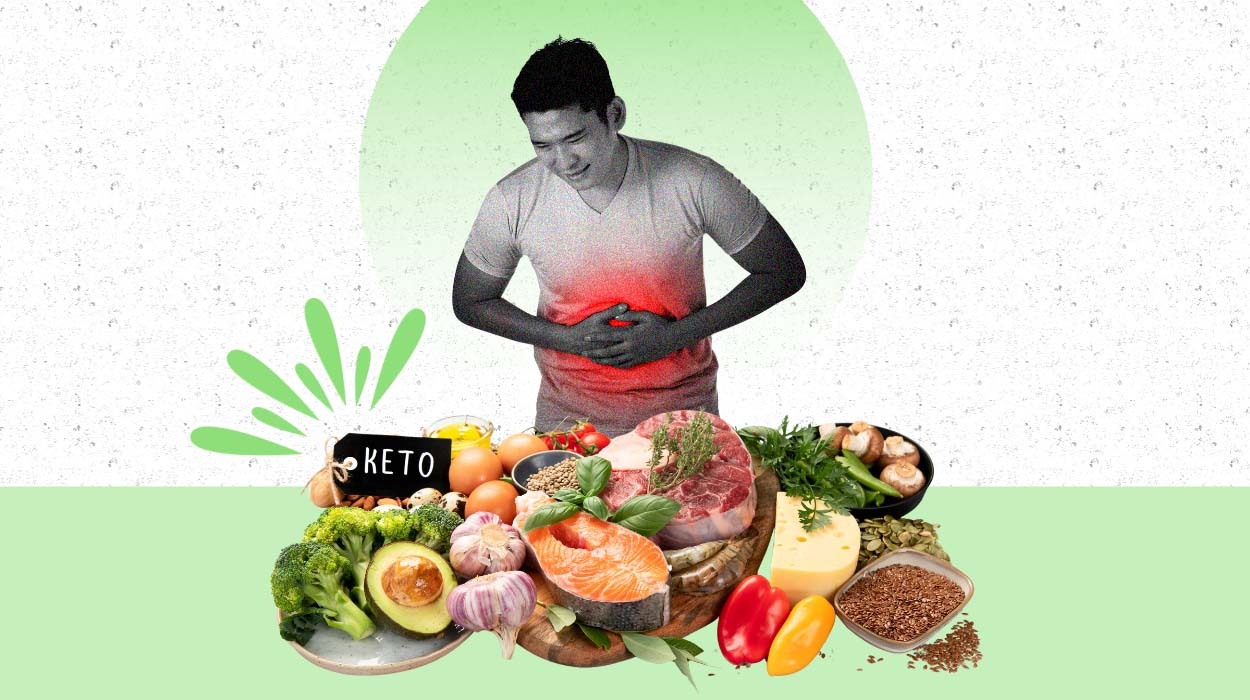 Expert's opinion
Expert's opinion
Expert's opinion
The article is a subjective view on this topic written by writers specializing in medical writing.
It may reflect on a personal journey surrounding struggles with an illness or medical condition, involve product comparisons, diet considerations, or other health-related opinions.
Although the view is entirely that of the writer, it is based on academic experiences and scientific research they have conducted; it is fact-checked by a team of degreed medical experts, and validated by sources attached to the article.
The numbers in parenthesis (1,2,3) will take you to clickable links to related scientific papers.
Keto Constipation: Causes, Treatment & Prevention For Better Health 2024

Had your keto diet been going well until it caused constipation? That can all change when keto constipation hits. Now you are uncomfortable, bloated, and unhappy. Let’s face it, being constipated can really get you down in the dumps. But it doesn’t have to.
There are a few reasons that the keto diet may cause constipation. The most common ones are that many keto diet-friendly foods are low in fiber and high in fat, both of which can lead to constipation.
The good news is many great fiber sources are keto-friendly. You just might not be eating enough of them. We will also share a few other ways to get things moving again. Are you ready to hear about them?
We bet you are.
Let’s chat about what keto diet constipation is, why it happens, and what you can do about it. Don’t stress; many effective ways exist to ease this undesirable symptom without blowing your diet. Are you ready to have healthy bowel movements again? We think so.
Cause Of Constipation On Keto
The keto diet can lead to constipation due to:
- A lack of dietary fiber
- Unhealthy, high-fat food consumption
Increasing fiber intake, drinking enough water, exercising, or using a heat pack can help relieve keto constipation. However, consult a doctor if you go a week without a bowel movement or experience severe symptoms
Why Keto Diet Cause Constipation?

So why does constipation often accompany the keto diet? There is a pretty simple reason. Let’s find out.
Lack Of Dietary Fiber
Many keto-friendly foods do not contain much fiber.[1] The type of fiber that helps with digestion is dietary fiber, a combination of water-soluble and insoluble fiber. Insoluble fiber may help move food through your digestive tract, which leads to regular bowel movements and can prevent constipation.
Another type of fiber is soluble fiber, which dissolves in water. Soluble fiber is beneficial because it can lower cholesterol and blood sugar levels.
Common high-fiber foods are whole grains, whole wheat products, oats, quinoa, legumes, and brown rice. Fiber is also found in fruits with edible skins such as peaches, apples, and pears. But what do all of these foods have in common? That’s right, they are all forbidden on the keto diet.
Keto-Friendly Sources Of Dietary Fiber
While many excellent sources of fiber aren’t keto-friendly, here are some that are:
- Leafy green vegetables, especially collard greens.
- Cauliflower.
- Brussels Sprouts.
- Artichokes.
- Chia seeds, pumpkin seeds, flaxseeds.
- Pecans and almonds.
- Avocados.
- Coconut.
- Fermented foods, such as sauerkraut.
- Blueberries and raspberries– only allowed in small amounts.
Unhealthy, High-Fat Foods Consumption
Another thing to consider is that certain fats can also lead to constipation. This is because high-fat foods are hard for your body to digest and can take a long time to break down. Eating a large amount of the following fats while on the keto diet can be another reason you are experiencing constipation on this high-fat diet.
- Cheese.
- Processed meats.
- Dairy products.
- Eggs.
- Red meat.
Another crucial fat consideration with the ketogenic, or any high-fat diet, is to note the difference between saturated and unsaturated fat. Saturated fats are also known as unhealthy fats and can lead to increased levels of triglycerides, harmful low-density lipoprotein cholesterol, and cardiovascular disease. It includes dairy and animal products such as meat and whole milk. Saturated fat intake should be limited in any diet, with The American Heart Association recommending that no more than 13 grams per day, or 5%-6% of your daily calories, are from unhealthy, saturated fat.
Unsaturated fats are also known as healthy fats. They are easier to digest. Unsaturated fats have been linked to lower levels of bad cholesterol, higher levels of good cholesterol, and lower rates of cardiovascular disease. Keto-friendly foods that contain both fiber and healthy sources of unsaturated fats are:
- Chia seeds, pumpkin seeds, and flaxseeds.
- Almonds, cashews, pecans, and pistachios.
Here are some more healthy fats for the keto diet.
The Keto And Constipation
Constipation
If you are constipated, you generally have less than three bowel movements in a week. Your stool, or bowel movements, cannot be effectively eliminated from your rectum. Constipation occurs because the stool is moving too slowly through your digestive system. This, in turn, can make your stool turn dry and hard.
Constipation can lead to pain, discomfort, and bloating. Other symptoms of constipation may include:
- Passing hard or lumpy stools.
- Straining or working hard to stool.
- Feeling like you can’t fully empty the stool from your rectum.
- Feeling like a blockage in your rectum that makes you unable to have a bowel movement.
You may have chronic constipation if you have two or more of the above symptoms lasting for three months or greater.
The Keto Diet
The ketogenic or keto diet is a low-carb, high-fat diet. The keto diet can be very effective at weight loss and has gained popularity recently. When correctly followed, the ultra-low carbohydrate intake of the keto diet will cause your body to go into ketosis. In ketosis, your body cannot break down carbs for energy, so it begins to burn fat.
Keto diets need to be followed precisely. If you eat a few too many carbs or don’t get the correct ratio of carbs to fat and protein, your body will not be in ketosis. And if you aren’t in ketosis, you won’t see weight loss or other ketogenic diet benefits.
Keto Diet Constipation: What To Do?
Up Your Fiber Intake!
To treat and prevent keto constipation, you should aim for a goal of 21 to 38 grams of fiber each day, depending on whether you are male or female. You can use a food-tracking app to help total your fiber intake to ensure you are getting enough. A keto-friendly fiber supplement is an excellent addition to your diet if your food sources aren’t giving you adequate amounts. In addition to this, there are some more keto-friendly ways to help. Keep reading to find out!
Other Ways To Help
- Drink water: Being well hydrated helps to both soften your stool and aid in the movement of stool through your digestive tract.
- Exercise: Stay active and getting regular exercise can be a huge help to get your digestion going.
- Walk after meals: Helps speed the digestive process along.
- Watch your stress levels: High stress can often negatively impact your ability to have regular bowel movements. Try to manage your stress to the best of your ability. Here’s one of the best keto meal delivery kits that can take some of the stress out of keto meal prep!
- Consistent schedule: Create a regular bowel movement schedule, and don’t ignore the urge to have a bowel movement if it comes.
- Heat Packs: While heat packs and warm baths don’t necessarily help you pass stool, they can help relieve some of the pain and discomfort caused by keto constipation.
- While not necessarily keto-friendly, here are some other foods that help with constipation such as fruits, whole grains, legumes, olive oil, etc.
Other Causes Of Constipation?
Aside from the keto diet leading to constipation, there are some other causes of constipation[2] that we want you to be aware of.
- Certain conditions: Such as diabetes, hypothyroidism, and hyperparathyroid diseases.
- Pregnancy
- Certain medications: Include opioid pain relievers, sedatives, some anti-depressants, and some blood pressure medications.
- Dehydration.
- Demographics: Older people and women tend to have higher rates of constipation.
- Multiple Sclerosis and Parkinson’s Disease.
- Blockage of the intestines: Such as a bowel obstruction, colon cancer, or strictures of the bowel.
When To See A Doctor?

You should see your physician if you have not had a bowel movement in a week or more. If you are concerned that your constipation may be caused by something other than your dietary choices, you should also see a doctor.
If not treated, constipation can lead to complications. One very common complication of constipation is hemorrhoids. Hemorrhoids occur when straining to have a bowel movement causes the veins around your rectum and anus to become swollen and painful.
Another relatively common complication is an anal fissure, which is a small tear in your anus caused by a large stool. Over-the-counter creams are effective in treating hemorrhoids, and fissures will generally heal independently.
Some less common but more severe complications of constipation are fecal impaction, where stool is truly stuck in your anus or rectum, and rectal prolapse, where straining to stool causes a portion of your rectum to protrude from your anus. Either of these complications will require a visit to your physician or hospital.
Other situations that warrant a visit to your physician are if your constipation is accompanied by vomiting, blood in your stool, severe abdominal pain, or unexplained weight loss. Constipation is generally not an emergency, but, in these situations, it can be.
Conclusion
Many people may know how frustrating it can be to have great success with your diet plan only to develop something as uncomfortable and frustrating as constipation. And the high-fat, low-carb keto diet can definitely be a culprit-especially if you are not getting adequate amounts of fiber in your diet and are eating large quantities of difficult-to-digest saturated fats.
The good news is that there are plenty of easy and keto-friendly things to do to ease and eliminate the keto diet constipation and the pain, discomfort, and bloating that comes with it. Many great fiber sources are keto-friendly. Other choices include increasing your water intake, taking a fiber supplement, increasing your physical activity, watching your stress, and more.
Don’t let keto constipation get you down, and don’t let it dampen your success on the ketogenic diet. We hope these suggestions will help ease your symptoms if you are currently experiencing keto constipation, and we also hope that they will prevent it if you are starting out on your keto journey.
+ 2 sources
Health Canal avoids using tertiary references. We have strict sourcing guidelines and rely on peer-reviewed studies, academic researches from medical associations and institutions. To ensure the accuracy of articles in Health Canal, you can read more about the editorial process here
- Holesh, J.E., Aslam, S. and Martin, A. (2023). Physiology, Carbohydrates. [online] Nih.gov. Available at: https://www.ncbi.nlm.nih.gov/books/NBK459280/.
- https://www.facebook.com/NIHAging (2022). Concerned About Constipation? [online] National Institute on Aging. Available at: https://www.nia.nih.gov/health/concerned-about-constipation [Accessed 12 Oct. 2023].



